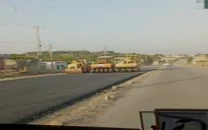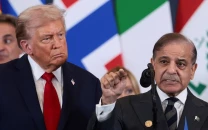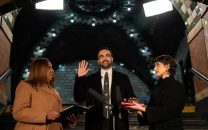The deep-rooted ties with Saudi Arabia
There has been a campaign by vested interests to sabotage this thriving relationship

As visits of Pakistan’s civil and military leaders to Saudi Arabia brought both countries even closer, and hopes of Pakistan getting out of the prevailing economic crisis strengthened, there has been a vicious campaign by vested interests within Pakistan and abroad, especially India, to sabotage this thriving relationship.
In the larger codification of things, Pakistan’s membership of the Organisation of Islamic Cooperation (OIC) is determined by the universal Islamic brotherhood, and the Kingdom of Saudi Arabia (KSA) is acknowledged as the origin of the OIC itself. Pakistanis have the utmost respect for Saudi Arabia and Khadim-e-Harmain Sharifain and turn to them for advice on issues affecting the Ummah.
Without delving into the specifics of a common past, it can be useful to refresh our memories with some of the high points of the Pak-Saudi relationship. Warm bilateral ties dating back to 1947 are based on Islamic beliefs as well as cultural and economic bonds. Both nations have been successful in creating an extraordinary but idiosyncratic synergy for collaborative development.
The Treaty of Friendship was signed in 1951. Since then both nations have never looked back and have continued to build on it by working closely together in matters of politico-economics, security and culture. The Royal Family holds a special place in Pakistan as the guardians of the two holy mosques. It goes without saying that we are required by our faith to defend the Kingdom of Saudi Arabia and the two holy mosques.
Above individuals and administrations, the Pak-Saudi relationship has grown stronger in politico-economic domains. Economic ties resulting from this special relationship have elevated KSA to the position of being Pakistan’s top oil supplier (by over 50%). Following the nuclear tests in 1998, KSA ensured unrestricted, free of cost supply of oil for four years. In 2019-2020 and afterwards, the Kingdom also provided oil on a delayed payment basis for a full year.
Almost two million Pakistanis live in Saudi Arabia from where they remit $6.5 billion annually. Around 15 million Pakistanis depend on the Pakistani diaspora employed in KSA.
Saudi assistance in building Pakistan’s infrastructure and saving its economy has remained significant. KSA’s financial contributions include $1.5 billion in 2014 and $3 billion in 2018, which was further extended to cover the period up to 2022. According to The Wall Street Journal, Saudi Arabia has signaled that it could provide Pakistan a $11 billion lifeline to overcome the challenges staring it in the face. As directed by Crown Prince Mohammad Bin Salman, the Saudi Fund for Development will conduct a study on increasing the deposit in Pakistan’s central bank to $5 billion from $3 billion. In addition, the Kingdom’s “generous announcement of $1 billion” for Pakistan’s flood victims during the Geneva conference has come as a big relief for the marooned people of Sindh and Balochistan.
It is also pertinent to note here the various contributions Pakistan has made towards Saudi Arabia. In the 1960s, Pakistani pilots operated RSAF fighter jets during Saudi Arabia’s Al-Wadiah conflict with Yemen as the PAF raised the RSAF (1969). Pakistan Army was crucial in helping the Saudi authorities put an end to the 1979 Grand Mosque Seizure. The emigration of Pakistanis helped create the contemporary Saudi Arabia. Doctors, engineers, professors and other professionals from Pakistan have spent their entire lives in Saudi Arabia and made significant contributions to the country’s growth and social advancement.
Saudi Arabia has traditionally trusted Pakistan as a brother and ally in matters of security. In the 1980s, Pakistan provided 15,000 soldiers for the defence of Saudi Arabia. In the first Gulf War, 13,000 Pakistani military personnel took part. Earlier, Pakistani Army engineers had constructed fortifications on the Saudi-Yemen border.
Around 1,800 Pakistani officers and soldiers are now serving in Saudi Arabia as part of a military training mission. Thousands of members of the Royal Saudi Armed Forces have also received training there, and Pakistan and KSA frequently host joint military drills.
Saudi leadership has always appreciated and understood Pakistan’s sensitivities, including its need for a secure western border with Afghanistan and Iran. However, the mischievous campaign by some fifth columnists to dent Pak-Saudi bonhomie should be rubbished as the product of a frustrated mindset propelled by India and her lackeys within Pakistan.
We hold KSA in the highest regard and base our relationships with other Muslim nations on the idea of global Islamic solidarity. Pakistan reiterates its steadfast commitment to Saudi Arabia’s security, promising to always be the Kingdom’s trustworthy security partner.
Prime Minister Shehbaz Sharif and COAS’s visit to KSA and the UAE came at a crucial time with an anticipation that these strategic level exchanges will help put our economy back on track. It is also important to note that China’s outreach to the Gulf and KSA has ushered in a new era of multilateralism: the CPEC project can assist the Pak-China-Gulf countries triangle in ushering in this new era of strategic partnership. To ensure an atmosphere of peace, prosperity and shared growth, Pakistan also needs Saudi leverage in relation to the Taliban government in Afghanistan.
The relationship and strategic cooperation between Pakistan and Saudi Arabia has evolved to meet the demands of the times; in the current multi-alignment environment, no nation can conduct its foreign affairs in the global arena with a binary foreign policy. States must protect their fundamental interests while enlisting the support of allies through a common goal in the face of the dynamic international and regional environment.
Pak-Saudi relations have seen many challenges and both brothers have withstood and weathered them together with perseverance and a shared vision. Pak-Saudi relations are unique and go beyond common interstate relations and are deeply rooted and entrenched in multifarious dimensions of history, faith, security, economics and a shared vision of development and quest for regional and international peace.
Published in The Express Tribune, January 17th, 2023.
Like Opinion & Editorial on Facebook, follow @ETOpEd on Twitter to receive all updates on all our daily pieces.














COMMENTS
Comments are moderated and generally will be posted if they are on-topic and not abusive.
For more information, please see our Comments FAQ